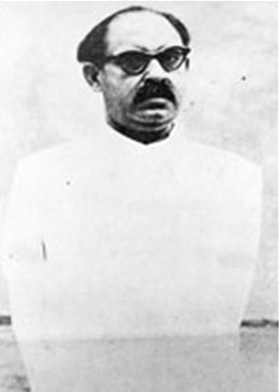Chiragh Hasan Hasrat
This is a collection of articles archived for the excellence of their content. Readers will be able to edit existing articles and post new articles directly |
Chiragh Hasan Hasrat
The Journalist-Writer
By Intizar Husain
LITERATURE and journalism don’t go well together. A writer who chooses journalism as his profession soon finds himself in a dilemma. He is disturbed to discover that his literary self is adamant to reconcile with his journalistic writings.
But ever so often, under the pressure of earning a livelihood, he slowly and gradually succumbs to the temptations of journalism which brings quick reward both in terms of money and fame. To be more precise, in this tug of war between the two forces which are seemingly akin to each other, the writer recedes in the background leaving the ground to be occupied by the journalist.
I have just read Dr Tayyab Munir’s well-researched work on Maulana Chiragh Hasan Hasrat which has been published by Adara-i-Yadgar-i-Ghalib, Karachi under the title Chiragh Hasan Hasrat, Ehwal-au-Asaar. Hasrat appears to be an example of the kind of writer I was just talking about. He is known to us as a leading journalist of his time, who had excelled in writing columns and won popularity on that count.
Now when he is no more among us and his contemporaries too have passed away one by one, we require a researcher like Dr Munir to tell us that Hasrat was in fact primarily a writer with some fine ghazals to his credit in addition to a number of fine prose works.
Maulana Chiragh Hasan Hasrat was born in Poonch in 1903. His father was a newly converted Muslim and had learnt Urdu and Persian. In his time the son too received a sound grounding in these two languages.
In addition, he became fully acquainted with the literary traditions of these languages and developed an interest in writing verses. In his early years he did some teaching, but to get a real start in life he had to undertake a long journey to Calcutta.
He reached Calcutta in 1921 where he came in contact with Maulana Abul Kalam Azad and joined his newly started daily Payam. This is how he started his career as a journalist. But if he turned to journalism it was not merely for the sake of keeping body and soul together, he had one more important reason for that.
He had in the mean time developed an interest in political affairs along with his involvement in literature. The first distinguished personality he came in contact with was a prominent political leader and at the same time a famous writer with a prose style of his own.
Maulana Chiragh Hasan Hasrat was very much under Maulana Azad’s spell and imagined that by joining journalism under his auspices he would be in a position to play some part in the ongoing struggle for India’s freedom.
He was very much under Maulana Azad’s spell and imagined that by joining journalism under his auspices he will be in a position to play some part in the ongoing struggle for freedom.
In fact those were the years when Urdu journalism was still very much under the dominance of leading literary figures. Each paper, whether a weekly or a daily, had some literary flavour which guaranteed the success of the publication.
Urdu journalism had not yet developed enough to be able to extricate itself from the influence of prose writers. And a writer working for a paper was hardly conscious of the fact that his pen-pushing for journalistic purposes will adversely affect his literary talent.
Rather, he regarded his journalistic writings as the byproduct of his literary engagements. For a political activist, journalism was a mission rather than a profession.
It was in this kind of atmosphere that Hasrat Sahib took up journalism and joined the staff of different dailies. At the same time he remained involved in his literary pursuits and wrote much prose as well as verse.
By temperament Hasrat Sahib was a classicist. He had drunk deep in the classical traditions of Urdu as well as Persian. As for his poetry, though he wrote different kinds of verses, including humorous poems, he was more expressive in writing ghazal.
But perhaps he was more a prose writer than a poet. Thankfully, he soon got rid of the influence of the grand prose style of Abul Kalam Azad and evolved his own style, which was nearer to colloquial Urdu.
But in his stories collected under the title Perbat Ki
Baiti he attempted a different kind of prose in which he is seen excelling in Hindi-ised Urdu, which is in perfect harmony with the cultural atmosphere of his stories picked out from Hindu mythology.
In the last phase of his life, which began with the editorship of Daily Imroze in 1948, Hasrat’s literary involvement seemed to be receding in the background. He emerged as the leading journalist of Pakistan who gave a new turn to Urdu journalism. It was at this time that he was seen both as a leading columnist as well as a prose writer.
